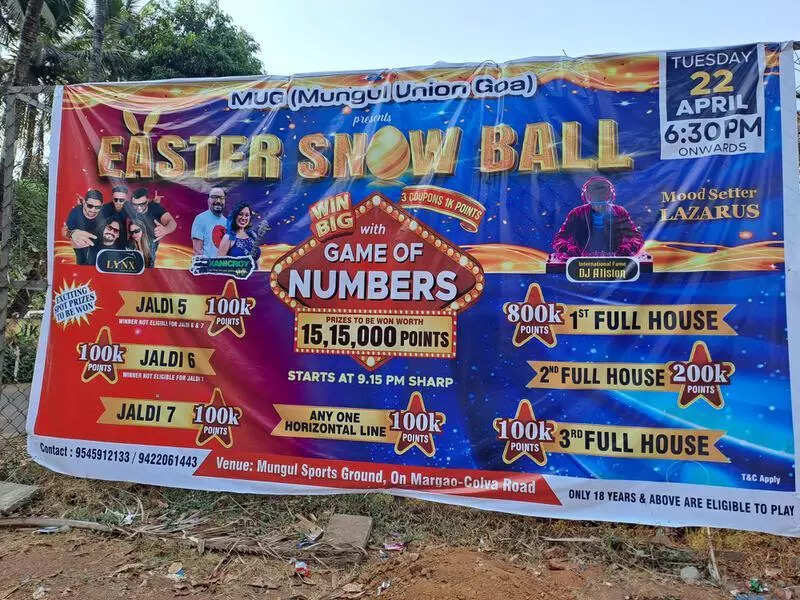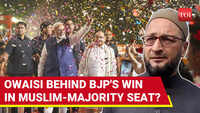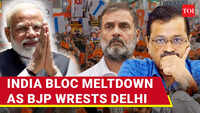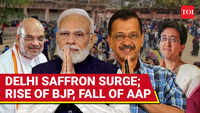Cash code-named ‘points’, housie ops gamble on rebranding to evade law

Colva: To circumvent the South Goa district administration’s directive banning gambling activities with large cash rewards, organisers of the widely popular Grand Housie have adopted a rebranding tactic. They have stopped advertising prize money in rupees and now refer to the winnings simply as “points” — a term that masks the actual monetary value but maintains the same high-stakes allure.
This strategic shift appears to be a calculated move to outmanoeuvre authorities while keeping the gambling engine running at full throttle. The term “points” is prominently featured on event posters, banners, and digital promotions.
But participants and law enforcement officers alike acknowledge that these so-called “points” often translate into real cash prizes — some reportedly reaching the equivalent of Rs 15 lakh.Despite the administrative clampdown, the housie phenomenon continues to gain momentum. Held under the garb of cultural and musical evenings, these events attract thousands from across Goa and even from neighbouring regions like Karwar and Belagavi.
With live performances as mere backdrops, the real attraction remains the massive prize pools camouflaged as “points”.
When questioned about the conspicuous absence of the rupee symbol and the rise of the term “points”, the officer said with a wry smile, “We all know what it really means. The terminology may have changed, but the essence remains the same.”
The use of “points” instead of explicit currency has given organisers a grey area in which to operate. This smokescreen makes it difficult for authorities to intervene unless participants or witnesses lodge formal complaints, said a lawyer.In the meantime, these events continue to flourish, emboldened by minimal regulatory oversight, enormous financial incentives, and seemingly unstoppable public enthusiasm.
Those in the know say that these gatherings often attract crowds in the tens of thousands, turning small local venues into bustling gambling hotspots. The promise of winning big — whether labelled in rupees or “points” — has proven irresistible to both seasoned players and curious newcomers.
The simplicity of organising such events, combined with low barriers to entry and sizable returns, has led to an explosion in similar happenings across South Goa.
What began as a localised pastime has now escalated into a widespread trend, raising urgent questions about enforcement, regulatory loopholes, and the broader social impact of such activities masquerading as cultural events.
This strategic shift appears to be a calculated move to outmanoeuvre authorities while keeping the gambling engine running at full throttle. The term “points” is prominently featured on event posters, banners, and digital promotions.
But participants and law enforcement officers alike acknowledge that these so-called “points” often translate into real cash prizes — some reportedly reaching the equivalent of Rs 15 lakh.Despite the administrative clampdown, the housie phenomenon continues to gain momentum. Held under the garb of cultural and musical evenings, these events attract thousands from across Goa and even from neighbouring regions like Karwar and Belagavi.
With live performances as mere backdrops, the real attraction remains the massive prize pools camouflaged as “points”.
DySP Siddhant Shirodkar confirmed that the authorities are monitoring the situation and have registered two cases under the Public Gambling Act in the jurisdiction of the Colva police station. “We are keeping a close watch. So far, two individuals have been booked. If more such cases come to our notice, action will be taken,” he said.
When questioned about the conspicuous absence of the rupee symbol and the rise of the term “points”, the officer said with a wry smile, “We all know what it really means. The terminology may have changed, but the essence remains the same.”
The use of “points” instead of explicit currency has given organisers a grey area in which to operate. This smokescreen makes it difficult for authorities to intervene unless participants or witnesses lodge formal complaints, said a lawyer.In the meantime, these events continue to flourish, emboldened by minimal regulatory oversight, enormous financial incentives, and seemingly unstoppable public enthusiasm.
Those in the know say that these gatherings often attract crowds in the tens of thousands, turning small local venues into bustling gambling hotspots. The promise of winning big — whether labelled in rupees or “points” — has proven irresistible to both seasoned players and curious newcomers.
The simplicity of organising such events, combined with low barriers to entry and sizable returns, has led to an explosion in similar happenings across South Goa.
What began as a localised pastime has now escalated into a widespread trend, raising urgent questions about enforcement, regulatory loopholes, and the broader social impact of such activities masquerading as cultural events.
Download
The Times of India for Latest
Subscribe
Start Your Daily Mornings with Times of India Newspaper!




















All Comments ()+^ Back to Top
Refrain from posting comments that are obscene, defamatory or inflammatory, and do not indulge in personal attacks, name calling or inciting hatred against any community. Help us delete comments that do not follow these guidelines by marking them offensive. Let's work together to keep the conversation civil.
HIDE